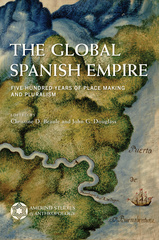Decolonizing Indigenous Histories
Exploring Prehistoric/Colonial Transitions in Archaeology
The University of Arizona Press
Decolonizing Indigenous Histories makes a vital contribution to the decolonization of archaeology by recasting colonialism within long-term indigenous histories. Showcasing case studies from Africa, Australia, Mesoamerica, and North and South America, this edited volume highlights the work of archaeologists who study indigenous peoples and histories at multiple scales.
The contributors explore how the inclusion of indigenous histories, and collaboration with contemporary communities and scholars across the subfields of anthropology, can reframe archaeologies of colonialism. The cross-cultural case studies employ a broad range of methodological strategies—archaeology, ethnohistory, archival research, oral histories, and descendant perspectives—to better appreciate processes of colonialism. The authors argue that these more complicated histories of colonialism contribute not only to understandings of past contexts but also to contemporary social justice projects.
In each chapter, authors move beyond an academic artifice of “prehistoric” and “colonial” and instead focus on longer sequences of indigenous histories to better understand colonial contexts. Throughout, each author explores and clarifies the complexities of indigenous daily practices that shape, and are shaped by, long-term indigenous and local histories by employing an array of theoretical tools, including theories of practice, agency, materiality, and temporality.
Included are larger integrative chapters by Kent Lightfoot and Patricia Rubertone, foremost North American colonialism scholars who argue that an expanded global perspective is essential to understanding processes of indigenous-colonial interactions and transitions.
The contributors explore how the inclusion of indigenous histories, and collaboration with contemporary communities and scholars across the subfields of anthropology, can reframe archaeologies of colonialism. The cross-cultural case studies employ a broad range of methodological strategies—archaeology, ethnohistory, archival research, oral histories, and descendant perspectives—to better appreciate processes of colonialism. The authors argue that these more complicated histories of colonialism contribute not only to understandings of past contexts but also to contemporary social justice projects.
In each chapter, authors move beyond an academic artifice of “prehistoric” and “colonial” and instead focus on longer sequences of indigenous histories to better understand colonial contexts. Throughout, each author explores and clarifies the complexities of indigenous daily practices that shape, and are shaped by, long-term indigenous and local histories by employing an array of theoretical tools, including theories of practice, agency, materiality, and temporality.
Included are larger integrative chapters by Kent Lightfoot and Patricia Rubertone, foremost North American colonialism scholars who argue that an expanded global perspective is essential to understanding processes of indigenous-colonial interactions and transitions.
‘This book amply illustrates archaeology’s vital role in the decolonization of Indigenous pasts and will be required reading for students of postcolonial studies, modern historical archaeology, and Indigenous archaeology.’—Cambridge Archaeological Journal
‘The essays in this collection make major contributions to the archaeology of colonialism, the interpretation of the colonial experience, and the decolonizing of anthropology.’—Choice Magazine
'In short, this is an excellent book, whose chapters and case studies add up to a coherent argument, which the editors themselves sum up most succinctly in their claim that this book is about 'decolonizing archaeology,' both conceptually and practically. Even if fully realizing this goal will require more time and a sustained effort, it seems to me that this book has nevertheless managed to set a first and most significant step towards that goal, and that it leads the way towards decolonizing both academic discourse and archaeological and heritage practices of European colonial situations. Through its comparative dimension, this book also reaches out beyond studies of European colonial- ism and marks a notably new step in the archaeology of colonialism in general.'—American Antiquity
Maxine Oland is a visiting lecturer in anthropology at Amherst College in Amherst, Massachusetts, and Smith College in Northampton, Massachusetts. Siobhan M. Hart is an assistant professor of anthropology at Binghamton University in Binghamton, New York. Liam Frink is an associate professor of anthropology at the University of Nevada, Las Vegas. He is the co-editor of the University of Arizona Press book series The Archaeology of Colonialism in Native North America.
Siobhan M. Hart, Maxine Oland, and Liam Frink
Part I. Beyond Dichotomies and Colonial Categories
2. The Rest Is History: Devaluing the Recent Past in the Archaeology of the Pueblo Southwest
Matthew Liebmann
3. The Discovery and Decolonization of Xaltocan, Mexico
Enrique Rodríguez-Alegría
4. Rock Art as Historical Sources in Colonial Contexts
Alistair Paterson
5. Decolonizing through Heritage Work in the Pocumtuck Homeland of Northeastern North America
Siobhan M. Hart
Part II. Scales of Transitions
6. Between the Longue Durée and the Short Purée: Postcolonial Archaeologies of Indigenous History in Colonial North America
Stephen W. Silliman
7. Lost in Tradition, Found in Transition: Scales of Indigenous History in Siin, Senegal
François G. Richard
8. When Does History Begin? Material Continuity and Change in West Africa
Ann B. Stahl
9. Lost among the Colonial Maya: Engaging Indigenous Maya History at Progresso Lagoon, Belize
Maxine Oland
10. Andean Households in Transition: The Politics of Domestic Space at an Early Colonial Doctrina in the Peruvian Highlands
Steven A. Wernke
11. Hidden Transcripts, Contested Landscapes, and Long-Term Indigenous History in Oaxaca, Mexico
Stacie M. King
Part III. Reflections: Found in Transitions
12. Archaeologies of Colonialism in Unexpected Times and Unexpected Places
Patricia E. Rubertone
13. Lost in Transition: A Retrospective
Kent G. Lightfoot
About the Editors
About the Contributors
Index

















